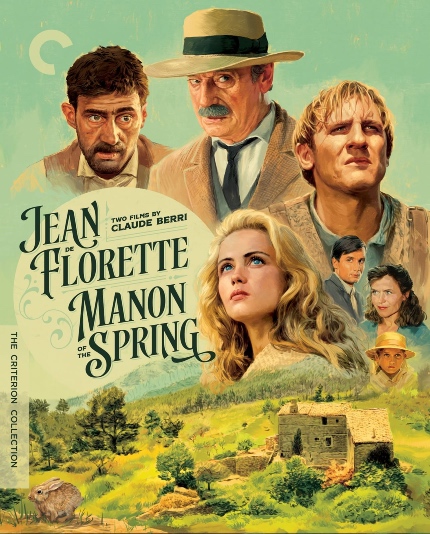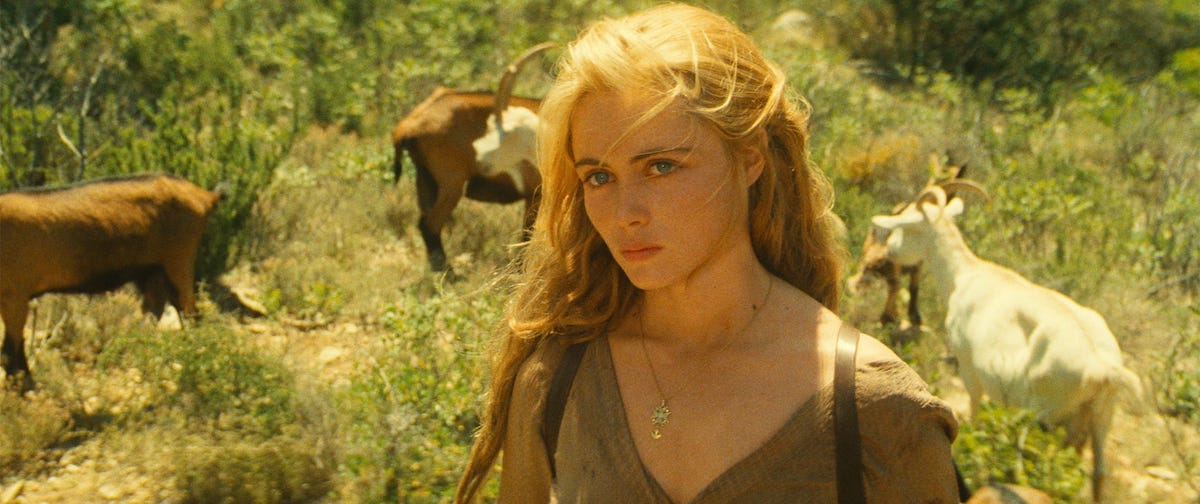JEAN DE FLORETTE / MANON OF THE SPRING 4K Review: Two Films by Claude Berri
Gérard Depardieu, Daniel Auteuil, Yves Montand, and Emmanuelle Béart star, as neighbours turn nasty in the French countryside.

A man trundles an overloaded cart up to the door of a disused French farmhouse, his wife and young daughter in tow. He is dressed in city finery, and seems a bit of an oaf: he "oohs" and "ahhs" at the plentiful beauty of the Provence countryside, and speaks of a desire to "cultivate the authentic" in his efforts at the farm.
Worst of all, he exhibits a significant hunched back, which -- to many of the local farmers -- is all they need to know about him. If his status as a city-bred outsider were not taint enough, his disability seals the deal. They will have nothing to do with the hunchback. They will, in fact, only refer to him as "the hunchback."
This man is Jean, or as he would locally be known if anyone locally knew of his provenance, Jean de Florette. ("Jean, Florette's son.") Florette grew up around here; the farmhouse was willed to her by Jean's uncle Bouffigue. Florette had already died, so it passed to Jean.
Jean's lineage is important, because it means that Jean is a descendent of this community, and his outsider status -- as understood by the rest of the town -- is untrue. But no one knows it. No one, that is, except the Soubeyrans.
What is known and unknown -- to the characters, and to us, the audience -- is the crucial strategy of Claude Berri's storytelling in Jean de Florette and its sequel / second part, Manon of the Spring. Filmed simultaneously by Berri in 1985 and released a few months apart in 1986, Berri is adapting Marcel Pagnol's novel, itself adapted from an initial sketch of the idea that Pagnol made as a film in 1952.
Importantly, we meet the Soubeyrans long before we meet the eponymous Jean in Jean de Florette. Old César Soubeyran (Yves Montand) is a rich landowner in Provence, and is delighted to see his nephew and ward, Ugolin (an unrecognizable Daniel Auteil) return home from war. Ugolin has a scheme: he wants to farm carnations. César likes this scheme; they just need a plot of land on which to do it.
And just as we, the audience, are wrapping our heads around these affable chaps' dilemma, they straight murder a man to get things started.
The man is Jean's uncle, and this entire sequence -- and our misdirected early sympathy for Ugolin's ambitions -- remains a piece of information that we hold as we watch Jean arrive. We aren't alone; the other farmers and townsfolk are relatively sure César killed Bouffigue to get his land, but they don't say anything to Jean. He's an outsider, after all (and a hunchback, to boot); why would they help him?
Worse: the locals know that there was once a spring on Jean's land that could give the newcomer all the water that he needs in order to farm his land. Given that the spring has mysteriously vanished, they're relatively sure César had something to do with that, too. But why help Jean? He's not from around here.
What proceeds through the rest of Jean de Florette is effectively a battle of wills between two families, where only one side even knows they're at war, and the bystanders -- those not directly affected -- refuse to involve themselves.
The Soubeyrans blocked the spring to drive down the value of the land and make it easier for them to buy it all up when Jean inevitably flees; Jean, overcome with naive dreams of a country life (and a stack of scientific manuals telling him how to breed rabbits, or how many days it rains in August), believes that between the help of god and his fellow man, he will prevail. He does not, of course, know that his fellow man is actively working against him.
It's a monumental work of storytelling, which unfolds in a Biblical breaking of Jean by forces beyond his control (community, money, weather, even the capacities of his own mind and body). The film's only VFX sequence sees an August drought followed by a sudden thunderstorm in the middle of the night; but it breaks over the next valley over, not Jean's.
Jean rends his garments and curses his maker as his crops die around him. That Jean de Florette seems unsettlingly topical in 2025 only betrays how long we've been stuck in the same foolish cycle as a species: God is capricious. Community is all there is.
Jean has a small daughter, who almost never speaks. Her name is Manon (Ernestine Mazurowna in Jean de Florette; Emanuelle Béart in Manon of the Spring) and she sees much that, being so young, she does not yet understand. It is Manon who carries us into the second film, which takes place ten years later; now an adult, Manon is still living on (what is now) Ugolin's land, working as a near-mute goatherd, and eking out her living by trapping small birds and rabbits.
When Ugolin sees Manon bathing nude in the hills one day -- she has become a spectacular, untamed beauty -- he falls instantly in love with her and decides she must become his wife. Uncle César approves: the Soubeyran line needs heirs.
There is, of course, only one problem, and it's a good thing Manon did not see Ugolin seeing her: if she had, the vengeance siren from Kill Bill would have played in her head. For Manon, when it comes to Ugolin and César Soubeyran, it's revenge on sight.
If Jean de Florette leans Biblical, Manon of the Spring goes full-tilt Shakespearean. Don't worry: for all the angst, this is effectively one of the comedies, pure Mythos of Spring storytelling (as Northrop Frye would have put it). The older generation's decay (including, in the case of the Soubeyran line, literal incest) is cast down, and the younger generation -- Manon and her beau, a local teacher -- rise up to build a revitalized world.
Manon, of course, doesn't just know that César and lovesick Ugolin hid the spring on their land from her father; she knows the location of the spring's source, and uses that knowledge to mete out justifiable punishment upon the whole community that wronged her father. And more of what is known and unknown -- this time to both the characters, and the audience -- becomes a hidden gravity well around which all the events revolve, until ancient connections between the families are finally laid bare.
Berri and his cinematographer, Bruno Nuytten, photograph both parts of the diptych with such tactile care that we can nearly smell Provence's dirt, baking under the weight of the summer air.
The 4K digital restoration for the Criterion Collection release (spine #1257) gives the golden hues of Jean de Florette plenty of room to breathe. This is a 4-disc set (two UHD discs, two Blu-rays), encoded in HDR-10 only in the 4K discs' case, and with (as usual) the supplements appearing only on the Blu-ray platters, to maximize disc space for the films themselves on the UHD copies.
Grain is fine but appreciable throughout, and the slightly cooler palette of Manon of the Spring nicely supports the storytelling as Manon grows, learns, and begins to take part in the story that stretches back decades before she was born.
There are two substantial extras: Claude Berri: The Card Dealer is a one-hour program about Berri's career, which appears on the Jean de Florette Blu-ray copy; and The Force of Destiny, made in 2017, which drills down on the production of these films. It appears on the Manon Blu-ray disc.
Jean de Florette
Director(s)
- Claude Berri
Writer(s)
- Marcel Pagnol
- Claude Berri
- Gérard Brach
Cast
- Yves Montand
- Gérard Depardieu
- Daniel Auteuil
Manon of the Spring
Director(s)
- Claude Berri
Writer(s)
- Marcel Pagnol
- Claude Berri
- Gérard Brach
Cast
- Yves Montand
- Emmanuelle Béart
- Daniel Auteuil









